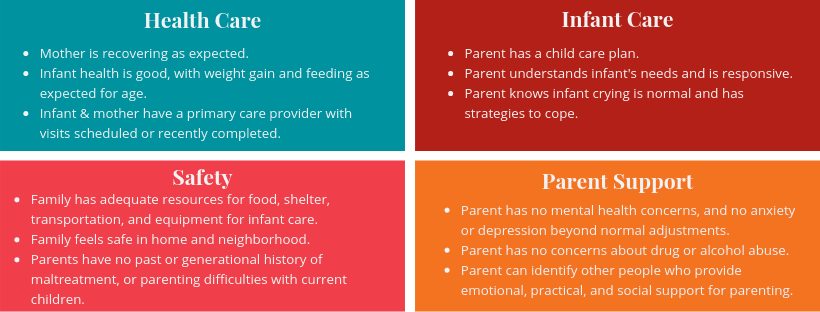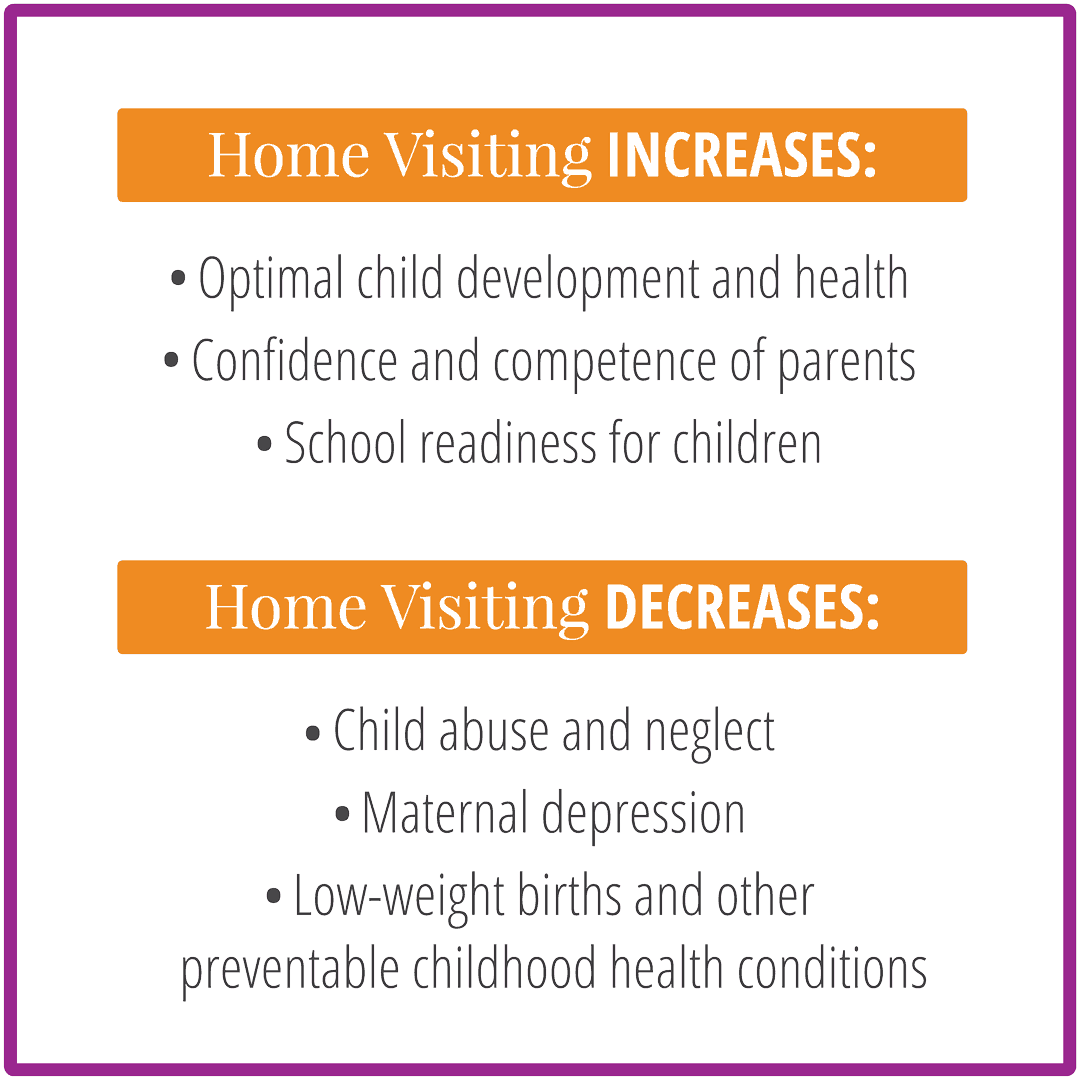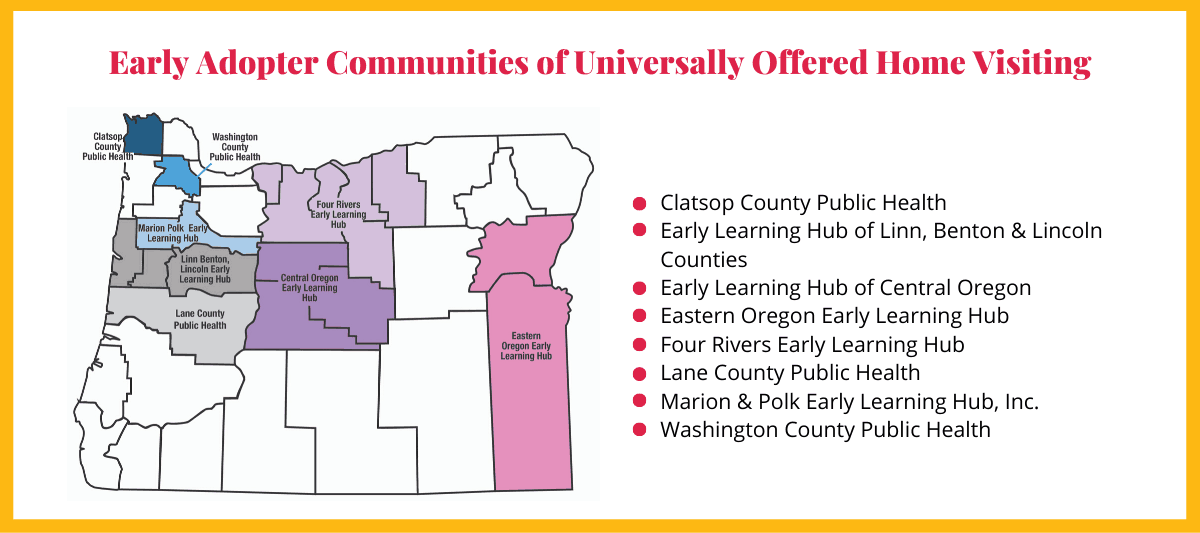The Oregon legislature approved funding earlier this year for Universally offered Home Visiting (UoHV), a program designed to support infants and toddlers and their families while promoting healthy development and early learning from the time a child is born. In August 2019, the Oregon Health Authority (OHA) selected eight areas of the state in which to roll out the program.
UoHV in Oregon will follow the Family Connects model, developed by Duke University and offered throughout North Carolina. We don’t have to go to North Carolina, though, to see the impact of the program. A look at Lincoln County—which has been offering universal home visits using the Family Connects model since 2017—gives a sense of what’s to come for families with newborns across Oregon.
Every Mother Can Benefit
Unlike other home visiting programs that serve specific populations, like first-time mothers, or children with special health care needs, Family Connects visits are available for any mother who wants them. Dr. Meredith Mann has been an obstetrician in Lincoln County for six years. She refers every patient she sees for voluntary home visiting.
“Regardless of your education level, job, or income, pregnancy can be a scary time,” Dr. Mann explains. Programs that target mothers based on risk factors or household income could leave many women without the beneficial support they need.
Amy Lunstedt, a nurse in Lincoln County who has been conducting home visits for the past six years, agrees. “Even families who are economically secure, or who aren’t dealing with trauma of some kind, have needs that a home visitor can address.”
The Family Connects model is an evidence-based approach that makes it easy for nurses to identify a family’s needs during the visit. During visits, nurses focus on twelve different domains.

These domains provide structure for the visits and are used as a tool for nurses to identify additional support or referrals a family might need. Lundstedt emphasized that home visits are not just about running through a checklist. Instead, nurses have in-depth conversations with mothers about a range of issues that fall under these domains. This includes feeding, crying, tummy time, appropriate infant behaviors, maternal nutrition, postpartum depression, birth control, car seats, household safety concerns, and any financial resources the family might need, such as the Supplemental Nutrition Assistance Program (SNAP). The nurse will also conduct a newborn health assessment. Heidi Harrington, another nurse home visitor we spoke with, says the families she visits are “giddy” to get this support.
“Mothers respond positively because nurses are respectful of people’s boundaries,” says Dr. Mann. The flexibility of the Family Connects approach makes that easy. Families can, for example, meet somewhere like a library if they prefer not to have a nurse in their home. Mothers can also choose when to schedule their home visit.
“It’s concierge medicine,” Dr. Mann says. “When I hear from mothers about the visits, they say ‘my nurse came over.’” These relationships between mothers and nurses last.
“Because we talk about so many different topics, mothers know they can call us with questions,” Harrington says. Nurses respond to follow-up calls by answering questions if they can or referring families to other supports, such as a lactation consultant.
Healthy Families, Healthy Communities
Shelley Paeth, the Maternal Child Health Program Manager for Lincoln County Health and Human Services, first heard about Family Connects in 2015. Though there were already several other home visiting programs in Lincoln County, she felt it was important to bring this universal, evidence-based approach to her community. It took roughly 18 months to strengthen relationships between nurses and doctors and hospitals, train nurses, and work with the Early Learning Hub of Linn, Benton & Lincoln Counties to roll out the program.

Paeth explains her rationale for bringing a program that serves every mother to the county.
“Pregnancy and postpartum are vulnerable times for everyone. And they’re a key time when women and new families are open to learning new information and motivated to make changes in their lives if they need to.”
In addition to providing a framework through which all mothers can receive support, the Family Connects model can help communities improve the services they provide. Following each home visit, nurses track the referrals they made for mothers and the services they need. The data helps reveal gaps in services.
From her experience conducting home visits, Amy knows her patients struggle with housing, transportation, and access to medical care. Children with special health needs must often leave the county for health care, and mental health supports are lacking. This reality can be difficult for nurses, knowing how hard it can be for patients to ask for mental health support. “It’s heartbreaking trying to help a patient who has finally decided to call for an appointment, only to be told there are no spaces available,” Amy reports. The data on referrals collected through home visits will help counties determine which programs and services, like mental health care, are most needed by the community.
Moving Forward Across the State
Now that the state has allocated funding for Universally offered Home Visiting, other counties are following Lincoln’s lead. The eight early adopter communities chosen by the Oregon Health Authority will begin delivering home visiting services in July of 2020.

Families with newborns will benefit from this support and the data from these visits will help the state continue to improve the health supports and other social services available in local communities.
Learn More About Home Visiting
